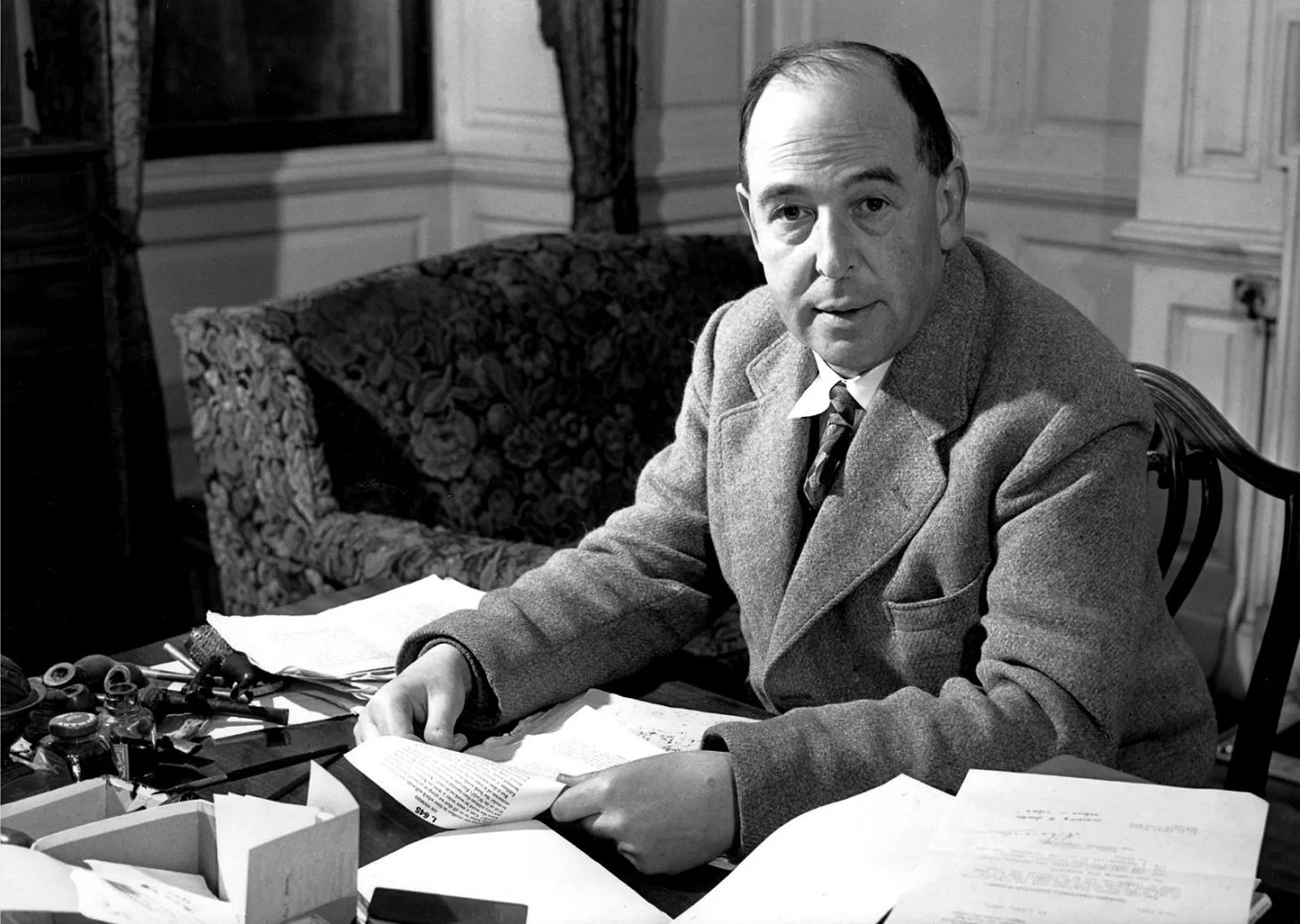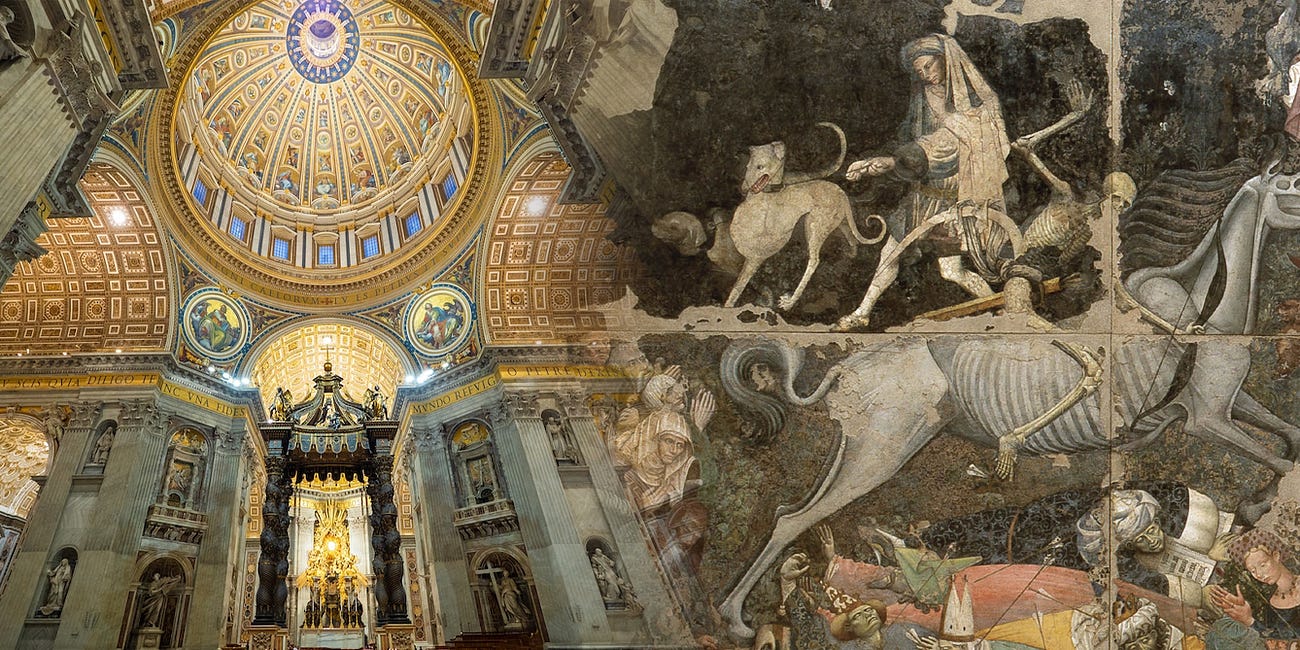C.S. Lewis’ “Weight of Glory”: Longing in the Poets, Composers & Theologians
By David Gosselin
People are often ashamed or confused about the idea of wrestling with eternal longing because it means first acknowledging a very specific kind of emptiness, one that can’t be filled by cake or any other earthly pleasure. C.S. Lewis gives his listeners heart by echoing St. Augustine who said, “God gives where he finds empty hands.”
C.S. Lewis famously discussed the role of an eternal “longing” innate within mankind. Lewis referred to this primordial spiritual using a specific German word, “Sehnsucht.” For Lewis, the longing for a something in the distance and an awareness of its unattainability within this world lay at the heart of mankind’s spiritual restlessness, its God hunger, and the need to have his mortal condition reconciled with something greater than himself.
Speaking on the nature of this particular longing in his sermon, “The Weight of Glory,” Lewis remarked:
“Almost our whole education has been directed to silencing this shy, persistent, inner voice; almost all our modem philosophies have been devised to convince us that the good of man is to be found on this earth.”
Interestingly, Lewis’ theological formulation in many ways echoes one of Edgar Allan Poe’s most ecstatic and poetical effusions on Beauty and poetry’s power to ignite a yearning for the sublimity of a hereafter. As a poet, Poe recognized this desire as something innate, calling it “an immortal instinct”:
“An immortal instinct, deep within the spirit of man, is thus, plainly, a sense of the Beautiful. This it is which administers to his delight in the manifold forms, and sounds, and odors, and sentiments amid which he exists. And just as the lily is repeated in the lake, or the eyes of Amaryllis in the mirror, so is the mere oral or written repetition of these forms, and sounds, and colors, and odors, and sentiments, a duplicate source of delight. But this mere repetition is not poetry. He who shall simply sing, with however glowing enthusiasm, or with however vivid a truth of description, of the sights, and sounds, and odors, and colors, and sentiments, which greet him in common with all mankind — he, I say, has yet failed to prove his divine title. There is still a something in the distance which he has been unable to attain. We have still a thirst unquenchable, to allay which he has not shown us the crystal springs. This thirst belongs to the immortality of Man. It is at once a consequence and an indication of his perennial existence. It is the desire of the moth for the star. It is no mere appreciation of the Beauty before us — but a wild effort to reach the Beauty above. Inspired by an ecstatic prescience of the glories beyond the grave, we struggle, by multiform combinations among the things and thoughts of Time, to attain a portion of that Loveliness whose very elements, perhaps, appertain to eternity alone. And thus when by Poetry, —or when by Music, the most entrancing of the Poetic moods — we find ourselves melted into tears — we weep then — not as the Abbaté Gravina supposes — through excess of pleasure, but through a certain, petulant, impatient sorrow at our inability to grasp now, wholly, here on earth, at once and for ever, those divine and rapturous joys, of which through the poem, or through the music, we attain to but brief and indeterminate glimpses.”
While Poe and Lewis use different frames to describe what poet Percy Bysshe Shelley described in one of his poems as the “desire of the moth for the star,” Lewis makes a very astute and necessary qualification in respect to how our appreciation for Beauty relates to this “Sehnsucht.” Lewis describes how it often appears in the form of shadows, sometimes mistakenly appearing in the form of objects, times, persons, or places—all of which are only intimations of the true object of our “Sehnsucht”:
“Our commonest expedient is to call it beauty and behave as if that had settled the matter. Wordsworth’s expedient was to identify it with certain moments in his own past. But all this is a cheat. If Wordsworth had gone back to those moments in the past, he would not have found the thing itself, but only the reminder of it; what he remembered would turn out to be itself a remembering. The books or the music in which we thought the beauty was located will betray us if we trust to them; it was not in them, it only came through them, and what came through them was longing. These things—the beauty, the memory of our own past—are good images of what we really desire; but if they are mistaken for the thing itself they turn into dumb idols, breaking the hearts of their worshippers. For they are not the thing itself; they are only the scent of a flower we have not found, the echo of a tune we have not heard, news from a country we have never yet visited.”
Lewis also spoke to the common sense of hesitancy people feel when faced with their own “Sehnsucht”:
“In speaking of this desire for our own faroff country, which we find in ourselves even now, I feel a certain shyness. I am almost committing an indecency. I am trying to rip open the inconsolable secret in each one of you—the secret which hurts so much that you take your revenge on it by calling it names like Nostalgia and Romanticism and Adolescence; the secret also which pierces with such sweetness that when, in very intimate conversation, the mention of it becomes imminent, we grow awkward and affect to laugh at ourselves; the secret we cannot hide and cannot tell, though we desire to do both. We cannot tell it because it is a desire for something that has never actually appeared in our experience. We cannot hide it because our experience is constantly suggesting it, and we betray ourselves like lovers at the mention of a name.”
People are often ashamed or confused about the idea of wrestling with eternal longing because it means acknowledging a very specific kind of emptiness, one that can’t be filled by cake or any other earthly pleasure. Here too, Lewis gives his listeners heart by echoing St. Augustine, who said “God gives where he finds empty hands”; Lewis reminds us that “God gives his gifts where he finds the vessel empty enough to receive them,” for, “a man whose hands are full of parcels cannot receive a gift.”
Two Poems on Sehnsucht
Lewis’ illuminating sermon puts us in a better position to appreciate and judge the quality of two particularly interesting poems on precisely the question of “Sehnsucht.” The poems are by the two leading classical poets of Germany, Friedrich Schiller and Johann Wolfgang von Goethe. Of interest to us is a comparison of the contrasting treatments of the Sehnsucht theme by the two poets.
We should note that both Goethe and Schiller are celebrated as the fathers of German Classicism, and were surely read by Lewis, who specifically chose to use the German word “Sehnsucht.” Both poets helped usher in Weimar Classicism along with their collaborators, like the philosopher Johann Gottfried von Herder and the classical philologist Wilhelm von Humboldt. Both also had many of their poetic works set to music by some of the greatest musical composers, including Schubert, Brahms, and Beethoven. While Goethe’s “Nur wer die Sehnsucht kennt” (Only he who longing knows) inspired one of Schubert’s most impassioned and compelling lieder (art songs), Schiller’s “Ode to Joy” supplied the lyrics for Beethoven’s Ninth Symphony—arguably the greatest symphonic work.
Let us compare how each poet uniquely treats the theme of human longing, “Sehnsucht.” Then we can examine the differences, using these examples as an opportunity to consider a more general idea of how art and poetry serve as natural vehicles for awakening this deep-seated desire, which aided by Lewis’ insights and theological acuity, allow us to define and better understand the nature of our own sehnsucht.
Goethe’s “Nur wer die Sehnsucht kennt” reads:
Only he who truly longs
Knows, what grips me.
Alone, the love that belongs
With me has been set free.
I look to the cloudy throngs
Across the deep blue sea:But ah! The sweet one who yearns
Remains far from me.
It dizzies me and burns
My innards daily.
Only he who truly longs
Knows what grips me!Translation © David B. Gosselin
Goethe’s piece appears to be a simple one (in many ways it is). However, within this seemingly simple work lies a great density of emotional tension and musical drama—qualities made transparent when worked out in a proper recitation, and even more so when performed as the score for Franz Schubert’s famous musical setting. There, the seemingly simple quality of Sehnsucht described by Goethe is expanded into new dimensions and brought to greater heights—all of which appear absent in the simple written text per se. And yet, these very lines succeeded in rousing a very deep sense of longing in no less than Schubert.
Indeed, a fundamental part of being able to fully appreciate a great classical poem is not only a matter of reading the literal text per se, but also considering how such a text—much like a musical score—functions off the page i.e. when it is properly recited and performed aloud. In this way, the various tensions and ironies found between the lines become transparent.
Consider the opening thematic statement of Goethe’s piece: “Nur wer die Sehnsucht Kennt/Weiss was ich leide.” (Only he who truly longs/knows what grips me). Goethe’s words are not a literal statement, but a musical statement. The classical poem is essentially a musical score, with contrapuntal ironies, rhythms, tones, and color, which when brought together allow a musical idea to unfold, develop, and transform.
A typical strophic poem has recurring statements, line lengths, and musical units, such as “stanzas” (which means “room” in Italian). There is repetition of both forms and phrases—something constant—but also something changing. In Platonic terms, this would be known as the process of “Becoming”—the tension unfolding between the unchanging unity of idea (Being) and the multiplicity of unfolding thoughts and images (Becoming).
Finding the poetry becomes a question of discovering the best ways to emphasize and convey the various changes and tensions woven throughout the composition. The apt reader learns to use the natural tension between the various lines, and across each new strophe and stanza to unearth new layers of richness. Out of this process emerges the unspoken musical idea between the lines.
Before proceeding to the text, readers should consider one more thing: is there really such a thing as repetition in classical poetry? Is a recurring statement or musical line ever really read in exactly the same way, or is the repetition only a special kind of variation? The same literal words appear, but the creative tension transforms the overall meaning with each successive strophe and stanza. All this becomes reflected in the most natural and effective of all instruments: the human singing voice.
The poem begins with “Nur wer die Sehnsucht kennt/Weiss was ich leider!” The literal translation reads: “Only he who longing knows/Knows what I suffer.” In the English, the verb “knows” is repeated twice, but the German text uses two distinct words for the same verb: “Wissen” and “Kennen.” While the nuance is lost in translation, recognizing the original German wording becomes important and informs us on how to unfold the tension between the opening lines.
The speaker in Goethe’s piece longs for something in the distance. There is an inherent tension between the object of desire and the poet who longs for it. His longing spans across the cloud-filled skies and deep blue sea.
In the second stanza, the poet describes how the consciousness and pain created by the parting distance burns his “innards daily.” Rather than diminishing it, the great distance only increases his desire:
But ah! The sweet one who yearns
Remains far from me.
It dizzies me and burns
My innards daily.
Only he who truly longs
Knows what grips me!
Exploring Goethe’s lines through the eyes of a musical composer provides additional degrees of insight into the poem’s musical dimensions and how they might be spoken aloud—an art that has been nearly lost in today’s world, much to the detriment of not only poetry, but thought itself—especially in respect to man’s ability to read and think between the lines. For Franz Schubert, the tension between Goethe’s seemingly simple lines offered an opportunity to plumb the depths of human longing.
At this point, we recommend readers listen to Schubert’s musical setting and work their way backwards. Consider the emotional tension unfolded by Schubert. How might this tension be captured in a proper recitation? How was Schubert able to take such seemingly simple strophes and lines and imbue them with so much depth, tension, and meaning? Are the recurring lines ever really repeated?
In the case of Goethe’s poem, the object of desire is a person: the beloved. It falls in the category Lewis termed “Adolescence” or “Romanticism.” Goethe’s longing doesn’t represent the kind described by Lewis, but if properly understood, it serves as an invitation to such things in the same way Wordsworth’s tendency to harken back to his past kindled deeper intimations cloaked in “nostalgia.” True “Sehnsucht” is “a forward-looking nostalgia,” says Lewis. Its destination is nowhere on Earth, though we find intimations of it everywhere here, given everyone is blessed with the same burden.
In a very Socratic sense, knowledge of where it isn’t and what it is not becomes our first approximation and taste of the thing we desire. The more we understand what it is not, the closer we become to appreciating and desiring the real thing.
What else might be an object of desire beyond any person, place, or thing? How might a poet treat such “Sehnsucht”?
Consider another example—also set to music by Schubert—by Friedrich Schiller.
Sehnsucht
Ah, if only I could somehow
Flee this vapor-haunted dale
And escape through some quick exit,
My days would be so joyful.
Lovely hills rise in the distance,
Ever young and ever green;
Had I wings or had I pinions,
I would climb those hills serene.Hearing songs filled with harmonies,
Sweet, god-sent melodies,
I breathe in the gentle breezes
And the balm of sweet seasons.
Golden fruit dangles, ripening
In-between dark leaves and branches;
Flowers blossom without fearing
Savage winter’s ravages.Oh! How sweet it must be, dwelling
Under an eternal sun,
With fragrant airs softly blowing
As streamlets endlessly run.
But the foaming waters stifle
Even my bravest attempts,
And my spirit only shudders
Before the frothing torrents.See! An empty bark is rocking,
But alas, no helmsman’s there:
Sails are open, tides are rising,
But should a mortal soul dare?
You must be bold; you must have faith,
Waiting is no fair god’s hand—
Only wonder carries man off
To that magic wonderland.Translation © David B. Gosselin
What is this “magic wonderland” Schiller speaks of? How can we get there? Is Schiller’s vision of the landscape described in the first stanza a place on earth at all? Is it even a description of something visible? What about the second, third, and fourth stanzas?
In the first stanza, Schiller counterpoints the image of a valley with the image of serene hilltops. This creates the initial tension which he unfolds and resolves through the poem’s successive stanzas. Rather than any image, place, or time per se, the tension between these various images, places, and times defines the real subject matter.
In the following stanzas, Schiller describes the sound of harmonies and god-sent melodies—a world without fear—where “Flowers blossom without fearing/
Savage winter’s ravages.” But by the end of stanza III, having lulled us into a dream-like state, Schiller forces us to break away from this ideal state by shifting the imagery to another kind of landscape, essentially introducing a new musical theme:
Oh! How sweet it must be, dwelling
Under an eternal sun,
With fragrant airs softly blowing
Where streamlets endlessly run.
But the foaming waters stifle
Even my bravest attempts,
And my spirit only shudders
Before the frothing torrents.
In pursuing this “Sehnsucht” (which remains unnamed), Schiller acknowledges and captures the emotional turmoil that often comes with longing for something seemingly so far out of reach.
It’s at precisely this moment that Schiller defines a faith in something beyond mere sensory knowledge, which he ironically treats as its own special category of objective knowledge—“wonder.” According to Schiller, it is by this “wonder” alone that we can enter the “magic wonderland”—a land of discovery, true inspiration, and divine enthusiasm, that is, true freedom from the dark valleys and frothing torrents of the merely earthly world.
Unlike Goethe’s poem, Schiller’s poem doesn’t seem to describe any physical location or object per se, or even the desire for a relationship with one. The ironies found in the images force our mind to consider an altogether different kind of landscape. And here is where only faith and wonder—humility in the face of divine mystery—allow us to enter.
While Schiller was not espousing any kind of pantheist or anti-Christian view when he wrote “no fair god’s hand” in the last quatrain of the final stanza, he was challenging those who were so complacent, in every sense of the word, that they no longer saw any genuine need for creative imagination, creative thought, or wonder of any kind. They believed their faith alone would carry them, absent any daring or hunger beyond a blind, unquestioning complacency. Schiller rejected a life and faith that was reduced to a joyless Formalism, which ran completely contrary to the notion of a race of created human beings in which the creation (man) is excited and longing to know its loving Creator. Thus, Schiller explicitly writes in the chorus of his “Ode to Joy”:
Chorus.
Be embrac’d, ye millions yonder!
Take this kiss throughout the world!
Brothers—o’er the stars unfurl’d
Must reside a loving Father.
Schiller’s poem on “Sehnsucht” reminds us that to truly appreciate what can at best be translated as “wonderland” i.e. a land of wonder—we must allow ourselves to be moved by wonder—as a child is. So, as Christ said, “Truly I tell you, unless you change and become like little children, you will never enter the kingdom of heaven” (Mathew 18:3).
Without this child-like awe, which requires us to accept and confess our hunger, we forever desire and seek lesser fruits. In this respect, Lewis in his “Weight of Glory” remarks:
“If we consider the unblushing promises of reward and the staggering nature of the rewards promised in the Gospels, it would seem that Our Lord finds our desires, not too strong, but too weak.”
So must we learn to long. In the words of C.S. Lewis, “this hunger is better than any other fullness, this poverty better than all other wealth.”
A Renaissance or New Middle Ages?
This is a featured chapter from my upcoming book, Slaying Mithra: Magic, Mystery and the Trance Formation of the West.
The Angel with the Broken Wing by Dana Gioia
It is absurd to think that the only way to tell if a poem is lasting is to wait and see if it lasts. The right reader of a good poem can tell the moment it strikes him that he has taken an immortal wound – that he will never get over it. That is to say, permanence in poetry as in love is perceived instantly. It hasn't to await the test of time. The proof of a poem is not that we have never forgotten it, but that we knew at sight that we never could forget it.
Brain Love
A story where John Keats’ poetry and crazy transhumanism collide in strange and unexpected ways.












Wonderfully written and translated. That faith which drives us on every day in the face of what seems to be insurmountable odds against happiness, is all that we really have to keep us sane in an insane world. The things we can control are the most important, as well as knowing what we cannot change or control. Thank you for posting this, it set my mind on fire.
Without this this child-like awe, which =====subtract a this?